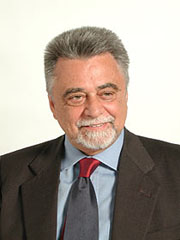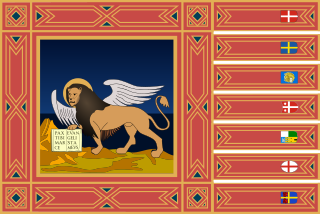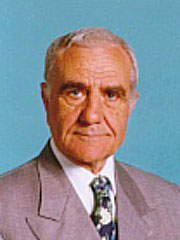
Christian Democracy was a Christian democratic political party in Italy. The DC was founded on 15 December 1943 in the Italian Social Republic as the ideal successor of the Italian People's Party, which had the same symbol, a crusader shield. As a Catholic-inspired, centrist, catch-all party comprising both centre-right and centre-left political factions, the DC played a dominant role in the politics of Italy for fifty years, and had been part of the government from soon after its inception until its final demise on 16 January 1994 amid the Tangentopoli scandals. Christian Democrats led the Italian government continuously from 1946 until 1981. The party was nicknamed the "White Whale" due to its huge organisation and official colour. During its time in government, the Italian Communist Party was the largest opposition party.

Amintore Fanfani was an Italian politician and statesman, who served as 32nd prime minister of Italy for five separate terms. He was one of the best-known Italian politicians after the Second World War and a historical figure of the left-wing faction of Christian Democracy. He is also considered one of the founders of the modern Italian centre-left.

Achille Leone Occhetto is an Italian political figure. He served as the last secretary-general of the Italian Communist Party (PCI) between 1988 and 1991, and was the first leader of the Democratic Party of the Left (PDS), the parliamentary socialist successor of the PCI, from 1991 to 1994.

The Union of the Centre, whose complete name is "Union of Christian and Centre Democrats", is a Christian-democratic political party in Italy. Lorenzo Cesa is the party's current secretary; Pier Ferdinando Casini was for years the most recognisable figure and de facto leader of the party, before eventually distancing from it in 2016. The UdC is a member of the European People's Party (EPP) and the Centrist Democrat International (CDI), of which Casini was president from 2004 to 2015.

General elections were held in Italy on 18 April 1948 to elect the first Parliament of the Italian Republic.

The 1963 Italian general election was held on Sunday April 28. It was the first election with a fixed number of MPs to be elected, as decided by the second Constitutional Reform in February 1963. It was also the first election which saw the Secretary of Christian Democracy to refuse the office of Prime Minister after the vote, at least for six months, preferring to provisionally maintain his more influent post at the head of the party: this fact confirmed the transformation of Italian political system into a particracy, the secretaries of the parties having become more powerful than the Parliament and the Government.

The 1972 Italian general election was held in Italy on 7 May 1972. The Christian Democracy (DC) remained stable with around 38% of the votes, as did the Communist Party (PCI) which obtained the same 27% it had in 1968. The Socialist Party (PSI) continued in its decline, reducing to less than 10%. The largest increase in vote share was that of the post-fascist Italian Social Movement, which nearly doubled its votes from 4.5% to about 9%, after its leader Giorgio Almirante launched the formula of the National Right, proposing his party as the sole group of the Italian right wing. After a disappointing result of less than 2%, against the 4.5% of 1968, the Italian Socialist Party of Proletarian Unity was disbanded; a majority of its members joined the PCI.

The 1976 Italian general election was held in Italy on 20 June 1976. It was the first election after the voting age was lowered to 18.

The 1979 Italian general election was held in Italy on 3 June 1979. This election was called just a week before the European vote: the failure to hold the two elections at the same time caused much criticism for wasting public money.

The 1994 Italian general election was held on 27 and 28 March 1994 to elect members of the Chamber of Deputies and the Senate of the Republic for the 12th legislature. Silvio Berlusconi's centre-right coalition won a large majority in the Chamber of Deputies but just missed winning a majority in the Senate. The Italian People's Party, the renamed Christian Democracy (DC), which had dominated Italian politics for almost half a century, was decimated. It took only 29 seats versus 206 for the DC two years earlier—easily the worst defeat a sitting government in Italy has ever suffered, and one of the worst ever suffered by a Western European governing party.

This page gathers the results of elections in Veneto.

Girolamo Li Causi was an Italian politician and a leader of the Italian Communist Party who was a prominent figure in the struggle for land reform and against the Mafia in Sicily. He labelled large estates Sicily's central problem.

The 1994 European Parliament election in Italy was the election of the delegation from Italy to the European Parliament in 1994.

The Politics of Sicily, Italy takes place in a framework of a semi-presidential representative democracy, whereby the President of Regional Government is the head of government, and of a pluriform multi-party system. Executive power is exercised by the Regional Government. Legislative power is vested in both the government and the Sicilian Regional Assembly.

Silvio Milazzo was an Italian Christian Democrayc politician and the president of Sicily from 1958 to 1960.

The Legislature III of Italy was the 3rd legislature of the Italian Republic, and lasted from 12 June 1958 until 15 May 1963. Its composition was the one resulting from the general election of 25 May 1958.

Giuseppe La Loggia was an Italian politician.

Benedetto Majorana della Nicchiara was an Italian politician.

Ludovico Corrao was an Italian Independent Left politician and lawyer. He was the promotor of the reconstruction of Gibellina, after its destruction caused by the earthquake which took place in the Valle del Belice in Sicily.

Emanuele Macaluso was an Italian trade unionist, politician, and journalist.



















